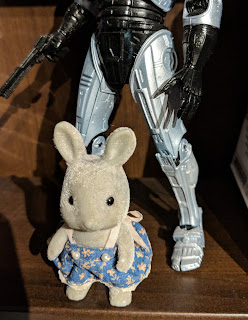The Magician's Book: A Skeptic's Adventures in Narnia
The Magician's Book: A Skeptic's Adventures in Narnia
Laura Miller, 2008
Laura Miller, 2008
The last time I looked at Narnia, I came away less than impressed. When I heard about this book, I was intrigued, but, well, skeptical.
The book is a combination of memoir, anecdote, history and literary criticism, as the author explores her own evolving relationship with the Narnia series. It's divided into three sections, ostensibly containing: the reasons the books are (or ought to be) beloved by a child, the reasons they are rejected in time, and a new way to appreciate them as an adult.
By the end of the first section, I felt Miller doth protest too much that these books are special. Her ideas and explanations for why particular stories are both attractive to children, and affect people all their lives, were interesting and poetic, if at times far fetched. She picks some of the most beautiful passages in Narnia to quote, and I freely admit there is beauty in some of the writing, and mystery and emotion as well, when not being overshadowed by plot idiocy. She paints a highly sympathetic picture, and the book she describes sounds good, but it's not what I see in the Narnia books.
I sympathize with the author, although I disagree with her conclusion. But I recognize that it costs me nothing to discard the Narnia books, because they weren't important to me. The Lion, the Witch and the Wardrobe was – to me – just one of the piles and piles of books I read in childhood. For years, I probably only remembered it because I enjoyed the BBC televised version. (Yes, the one where a small actor in a body suit is a 'mouse'.)
For Laura Miller, it was THE BOOK of her childhood, the one that introduced her to fantasy, the one that taught her to love reading. I share her sense of betrayal, when you realize the Narnia stories aren't what they appear to be on the surface. But since Narnia wasn't my BOOK, I was able to put it down and walk away. I can only imagine the feeling if one of the books important to me, like The Prydain Chronicles, or The Phantom Tollbooth, was later revealed to have an ulterior motive that I so strongly rejected. I understand her desire to find anything worth saving from the series, worth enjoying as an adult.
I did enjoy the impulse to try to steal Aslan away from the Christian framework. After all, death and resurrection is hardly exclusive to Jesus in the history of religion.
So when Lewis's child readers don't see Christianity in the Chronicles, they are in fact perceiving a truth about Narnia that adults usually miss. The Christianity in Narnia has been substantially, rather than just superficially, transformed – to the point of being much less Christian, perhaps, than Lewis intended.
In the second section, she relates anecdotes from various people on how betrayed they felt upon finding out the “truth” about Narnia, and goes on to basically agree that the books are sexist, racist, and lazily written. As the defender, of a sort, she finds interest in these aspects by diving into Lewis' life story, and doesn't explain away the problems, but casts them in the light of his personal situation and personal hang-ups. It's fascinating, but knowing that the Calmorenes are so incredibly offensive because Lewis disliked the Arabian Nights, not because he disliked the Turkish people, and that many British writers of the time used garlic as shorthand for “dirty foreigner”, doesn't change the fact that they're incredibly offensive, and Miller acknowledges this.
In the third section, though, her arguments really start to show their fragility. She spends some time saying, more or less: 'Lewis just threw everything he liked from religion and myth and fairy tales into a big pot and stirred, because he didn't care whether it made any sense. Isn't that charming?' My response: 'Actually, it's kinda lazy.' She also attempts to make the case that the dualistic, 'opposing teams' vibe between the fans of Lewis and Tolkien is silly, and then goes on to say that while of course she likes The Lord of the Rings, it just doesn't come through for her, either emotionally or as great literature. So at this point, I don't completely trust her judgment.
All the biographical analysis of both Lewis and Tolkien is interesting, but I'm sure it isn't new to anyone who has studied them.
I think, after reading this, I actually am likely to give Narnia a fairer shake than I have before, but not as great children's literature. As a work that inspired many others, okay. As the product of it's time, as the work of a deeply conflicted person, sure. I'll buy that.
As a work that is personally important to many people, who see beauty there, and from there, seek beauty elsewhere? It doesn't work that way for me, but I have read and loved too many objectively terrible books to fairly condemn anyone's personal choice.
And after all, Miller and I agree on one salient point: The Last Battle is absolute crap.
3 Stars - A Good Book



Comments
Post a Comment
FYI: Most comments are moderated, and will not appear immediately.